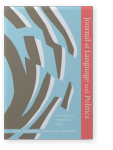Narratives of dialogue in parliamentary discourse
Constructing the ethos of the receptive politician
This paper puts forward an argument about the relation between narratives and constructed dialogue in political discourse.
Narratives of dialogue are special cases of constructed dialogue that emphasize the embeddedness of the speaker, displayed as a discourse
participant engaging in a conversation with an ordinary citizen or a public figure. Close analysis of British, German, and French
parliamentary debates reveals how narratives of dialogue shape an image of the speaker involved in a dialogue. While being engaged in the
activity of debating, parliamentarians simultaneously perform the act of debating. I argue that the main point of narratives of dialogue is
not so much to report on a prior or hypothetical situation, but to create the ethos of a Member of Parliament receptive to their
interlocutors.
Article outline
- 1.Introduction
- 2.Bringing constructed dialogue and narratives together
- 3.Collecting and annotating quotes from a corpus of parliamentary debates
- 4.Indeterminate voices: Establishing a dialogue with the opponents
- 5.Well-known voices: Displaying the professional politician
- 6.Singular anonymous voices: Talking to the ordinary voter
- 7.Conclusion: Narratives of dialogue in the service of ethos of familiarity and authenticity
- Notes
-
References
References
Amossy, Ruth
2001 “
Ethos at the Crossroads of Disciplines: Rhetoric, Pragmatics, Sociology.”
Poetics Today 22 (1): 1–23.


Bamberg, Michael, and Alexandra Georgakopoulou
2008 “
Small Stories as a New Perspective in Narrative and Identity Analysis.”
Text & Talk 28 (3): 377–96.


Baynam, Mike, and Stef Slembrouck
2009 “
Speech Representation and Institutional Discourse.”
Text – Interdisciplinary Journal for the Study of Discourse 19 (4): 439–58.

Bischof, Karin, and Cornelia Ilie
Bull, Peter, and Anita Fetzer
2010 “
Face, Facework and Political Discourse.”
Revue Internationale de Psychologie Sociale 23 (2): 155–85.

Bublitz, Wolfram
2015 “
Introducing Quoting as a Ubiquitous Meta-Communicative Act.” In
The Pragmatics of Quoting Now and Then, edited by
Jenny Arendholz,
Wolfram Bublitz, and
Monika Kirner-Ludwig, 1–26. Berlin/Boston: Mouton de Gruyter.


Burkhardt, Armin, and Kornelia Pape
eds. 2000 Sprache des deutschen Parlamentarismus. Studien zu 150 Jahren parlamentarischer Kommunikation. Wiesbaden: Springer.

Dunmire, Patricia L.
2005 “
Preempting the Future: Rhetoric and Ideology of the Future in Political Discourse.”
Discourse & Society 16 (4): 481–513.


Fetzer, Anita
2012 “
Quotations in monologic and dialogic political discourse.” In
Proceedings of the ESF Strategic Workshop on Follow-Ups Across Discourse Domains: a Cross-Cultural Exploration of their Forms and Functions, 72–86. Universität Würzburg.

Fetzer, Anita, and Peter Bull
2012 “
Doing Leadership in Political Speech: Semantic Processes and Pragmatic Inferences.”
Discourse & Society 23 (2): 127–44.


Fetzer, Anita, and Elda Weizman
2018 “
‘What I Would Say to John and Everyone like John Is …’: The Construction of Ordinariness through Quotations in Mediated Political Discourse.”
Discourse & Society 29 (5): 495–513.


Goffman, Erving
1981 Forms of Talk. Philadelphia: University of Pennsylvania Press.

Heiden, Serge
2010 “
The TXM Platform: Building Open-Source Textual Analysis Software Compatible with the TEI Encoding Scheme.” In
24th Pacific Asia Conference on Language, Information and Computation, edited by
Ryo Otoguro,
Kiyoshi Ishikawa,
Hiroshi Umemoto,
Kei Yoshimoto, and
Yasunari Harada, 389–98. Institute for Digital Enhancement of Cognitive Development, Waseda University.
[URL]
Holt, Elizabeth
2009 “
Reported Speech.” In
Handbook of Pragmatics, edited by
Jan-Ola Östman and
Jef Verschueren, 1–19. Amsterdam: John Benjamins.


Ihalainen, Pasi, Cornelia Ilie, and Kari Palonen
2016 “
Parliament as a Conceptual Nexus.” In
Parliament and Parliamentarism. A Comparative History of a European Concept, 1–16. New York/Oxford: Berghahn.


Ilie, Cornelia
2006 “
Parliamentary Discourses.” In
Encyclopedia of Language & Linguistics, edited by
Keith Brown, 2nd ed., 188–97. Oxford: Elsevier.


Kranert, Michael
2017 “
‘Today I Offer You, and We Offer the Country a New Vision’: The Strategic Use of First Person Pronouns in Party Conference Speeches of the Third Way.”
Discourse & Society 28 (2): 182–203.


Kuo, Sai-Hua
2001 “
Reported Speech in Chinese Political Discourse.”
Discourse Studies 3 (2): 181–202.


Labov, William
1972 Language in the Inner City. Studies in Black English Vernacular. Oxford: Basil Blackwell.

Ryfe, David M.
2006 “
Narrative and Deliberation in Small Group Forums.”
Journal of Applied Communication Research 34 (1): 72–93.


Semino, Elena, and Mick Short
2004 Corpus Stylistics: Speech, Writing and Thought Presentation in a Corpus of English Writing. London/New York: Routledge.


Tannen, Deborah
1986 “
Introducing Constructed Dialogue in Greek and American Conversational and Literary Narrative.” In
Direct and Indirect Speech, edited by
Florian Coulmas, 311–32. Berlin/New York/Amsterdam: Mouton de Gruyter.


Tannen, Deborah
2007 Talking Voices. Repetition, Dialogue and Imagery in Conversational Discourse. 2nd edition. Cambridge: Cambridge University Press.


Truan, Naomi
2016a “
Parliamentary Debates on Europe at the Assemblée Nationale (2002–2012) [Corpus].”
ORTOLANG (Open Resources and Tools for LANGuage).
[URL]
Truan, Naomi
2016b “
Parliamentary Debates on Europe at the Deutscher Bundestag (1998–2015) [Corpus].”
ORTOLANG (Open Resources and TOols for LANGuage).
[URL]
Truan, Naomi
2016c “
Parliamentary Debates on Europe at the House of Commons (1998–2015) [Corpus].”
ORTOLANG (Open Resources and TOols for LANGuage).
[URL]
Truan, Naomi
2016d “
« Les citations doivent être exactes ! ». Pratiques polémiques de la citation au parlement.”
Travaux interdisciplinaires sur la parole et le langage, 32.
[URL]
Truan, Naomi
2019a “
Talking about, for, and to the People: Populism and Representation in Parliamentary Debates on Europe.”
Zeitschrift für Anglistik und Amerikanistik 67 (3): 307–37.


Wieczorek, Anna Ewa
2016 “
I hope you don’t mind me quoting you”: Narrative reports in the service of (de)legitimisation. In
Janusz Badio (ed.),
Events and Narratives in Language (Lodz Studies in Language)
, vol. 521, 205–221. Frankfurt am Main: Peter Lang.

Cited by
Cited by 2 other publications
Ilie, Cornelia
2023.
Dialogue and dialogic perspectives on actions, interactions and practices across contexts.
Journal of Pragmatics 203
► pp. 110 ff.

This list is based on CrossRef data as of 5 july 2024. Please note that it may not be complete. Sources presented here have been supplied by the respective publishers.
Any errors therein should be reported to them.
